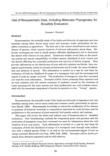Use of Biosystematic Data, Including Molecular Phylogenies, for Biosafety Evaluation
JIRCAS international symposium series
| ISSN | 13406108 |
|---|---|
| 書誌レコードID(総合目録DB) | AA1100908X |

本文フルテキスト
intlsymp-5_53-66.pdf375.78 KB
Biosystematics, the scientific study of the kinds and diversity of organisms and relationships among them, serves many social and economic needs, particularly for biosafety evaluation in agriculture. The first use is the correct classification and nomenclature of species, which ensures retrieval of relevant information about them. Molecular techniques are used to clarify genetic affinities (phylogenies) and to determine the closest wild relatives of crop plants. Systematic studies reveal data on the breeding system and sexual compatibility of related species, likelihood of such crosses and the factors affecting the successful production and survival of hybrid progeny. They provide information on the distribution of crop and wild relatives worldwide, their ecological requirements, status in natural environments and if weedy, the areas of infestation and patterns of spread. This information is needed on a case by case basis for evaluation of both the likelihood of escape of a transgenic trait and the environmental impact if such an escape occurred. The production of transgenic crops has increased our need for such information. Examples will be drawn primarily from rapeseed and its wild relatives and will include examples of confusion caused by the existence of Latin synonyms for the same species and their preferential use, and problems associated with the taxonomic assignment of species to separate or even "wrong" genera.
| 作成者 | Suzanne I. Warwick |
|---|---|
| 公開者 | Japan International Research Center for Agricultural Sciences |
| オンライン掲載日 | |
| 号 | 5 |
| 開始ページ | 53 |
| 終了ページ | 66 |
| 言語 | eng |
